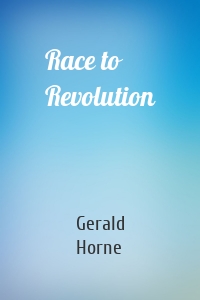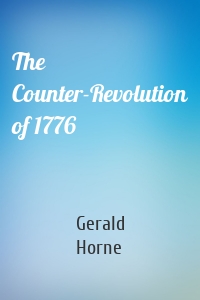Gerald Horne
14 кн.
The Dawning of the Apocalypse
August 2019 saw numerous commemorations of the year 1619, when what was said to be the first arrival of enslaved Africans occurred in North America. Yet in the 1520s, the Spanish, from their imperial perch in Santo Domingo, had already brought enslaved Africans to what was to become South Carolina. The enslaved people here quickly defected to local Indigenous populations, and compelled their captors to flee. Deploying such illuminating research, The Dawning of the Apocalypse is a riveting...
| Автор | Gerald Horne |
Jazz and Justice
A galvanizing history of how jazz and jazz musicians flourished despite rampant cultural exploitation The music we call “jazz” arose in late nineteenth century North America—most likely in New Orleans—based on the musical traditions of Africans, newly freed from slavery. Grounded in the music known as the “blues,” which expressed the pain, sufferings, and hopes of Black folk then pulverized by Jim Crow, this new music entered the...
| Автор | Gerald Horne |
Confronting Black Jacobins
The Haitian Revolution, the product of the first successful slave revolt, was truly world-historic in its impact. When Haiti declared independence in 1804, the leading powers—France, Great Britain, and Spain—suffered an ignominious defeat and the New World was remade. The island revolution also had a profound impact on Haiti’s mainland neighbor, the United States. Inspiring the enslaved and partisans of emancipation while striking terror throughout the Southern...
| Автор | Gerald Horne |
Race to Revolution
The histories of Cuba and the United States are tightly intertwinedand have been for at least two centuries. In Race to Revolution,historian Gerald Horne examines a critical relationship betweenthe two countries by tracing out the typically overlooked interconnectionsamong slavery, Jim Crow, and revolution. Slavery wascentral to the economic and political trajectories of Cuba and theUnited States, both in terms of each nation’s internal political andeconomic development and in the...
| Автор | Gerald Horne |
The Apocalypse of Settler Coloniali...
Virtually no part of the modern United States—the economy, education, constitutional law, religious institutions, sports, literature, economics, even protest movements—can be understood without first understanding the slavery and dispossession that laid its foundation. To that end, historian Gerald Horne digs deeply into Europe’s colonization of Africa and the New World, when, from Columbus’s arrival until the Civil War, some 13 million Africans and some 5...
| Автор | Gerald Horne |
The Deepest South
During its heyday in the nineteenth century, the African slave trade was fueled by the close relationship of the United States and Brazil. The Deepest South tells the disturbing story of how U.S. nationals – before and after Emancipation – continued to actively participate in this odious commerce by creating diplomatic, social, and political ties with Brazil, which today has the largest population of African origin outside of Africa itself.Proslavery Americans began to accelerate their...
| Автор | Gerald Horne |
Race Woman
One of the most intriguing activists and artists of the twentieth century, Shirley Graham Du Bois also remains one of the least studied and understood. In Race Woman , Gerald Horne draws a revealing portrait of this controvertial figure who championed the civil rights movement in America, the liberation struggles in Africa and the socialist struggles in Maoist China. Through careful analysis and use of personal correspondence, interviews, and previously unexamined documents, Horne explores her...
| Автор | Gerald Horne |
The Color of Fascism
What does it mean that Lawrence Dennis—arguably the “brains” behind U.S. fascism—was born black but spent his entire adult life passing for white? Born in Atlanta in 1893, Dennis began life as a highly touted African American child preacher, touring nationally and arousing audiences with his dark-skinned mother as his escort. However, at some point between leaving prep school and entering Harvard University, he chose to abandon his family and his former...
| Автор | Gerald Horne |
Race War!
Japan’s lightning march across Asia during World War II was swift and brutal. Nation after nation fell to Japanese soldiers. How were the Japanese able to justify their occupation of so many Asian nations? And how did they find supporters in countries they subdued and exploited? Race War! delves into submerged and forgotten history to reveal how European racism and colonialism were deftly exploited by the Japanese to create allies among formerly colonized people of color. Through...
| Автор | Gerald Horne |
The Counter-Revolution of 1776
Illuminates how the preservation of slavery was a motivating factor for the Revolutionary War The successful 1776 revolt against British rule in North America has been hailed almost universally as a great step forward for humanity. But the Africans then living in the colonies overwhelmingly sided with the British. In this trailblazing book, Gerald Horne shows that in the prelude to 1776, the abolition of slavery seemed all but inevitable in London, delighting Africans as much as it outraged...
| Автор | Gerald Horne |
Black and Brown
Winner of a 2005 Gustavus Myers Outstanding Book Award (Honorable Mention)The Mexican Revolution was a defining moment in the history of race relations, impacting both Mexican and African Americans. For black Westerners, 1910–1920 did not represent the clear-cut promise of populist power, but a reordering of the complex social hierarchy which had, since the nineteenth century, granted them greater freedom in the borderlands than in the rest of the United States.Despite its lasting...
| Автор | Gerald Horne |
Red Seas
During the heyday of the U.S. and international labor movements in the 1930s and 1940s, Ferdinand Smith, the Jamaican-born co-founder and second-in-command of the National Maritime Union (NMU), stands out as one of the most—if not the most—powerful black labor leaders in the United States. Smith’s active membership in the Communist Party, however, coupled with his bold labor radicalism and shaky immigration status, brought him under continual surveillance by U.S. authorities,...
| Автор | Gerald Horne |
Facing the Rising Sun
The surprising alliance between Japan and pro-Tokyo African Americans during World War II In November 1942 in East St. Louis, Illinois a group of African Americans engaged in military drills were eagerly awaiting a Japanese invasion of the U.S.– an invasion that they planned to join. Since the rise of Japan as a superpower less than a century earlier, African Americans across class and ideological lines had saluted the Asian nation, not least because they thought its very existence undermined...
| Автор | Gerald Horne |















